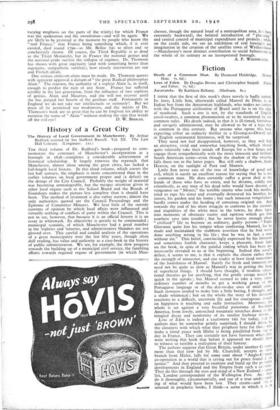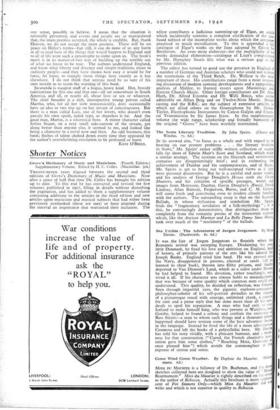Fiction
Jacaranda. By Kathleen Bellamy. (Methuen. 8s.)
I THINK that the first of this week's three novels is badly named. Its hero, Little Son, afterwards called Manoel de Deus, is an Indian boy from the Amazonian highlands, who makes no contact with the Portuguese civilisation of Brazil until he is on the edge of manhood. Such a one is not, by the standards of English novel-readers, a common phenomenon or to be measured by our common rules. His death indeed, in that it is ill-timed, fortuitous and savagely administered, may be allowed to be of a type that is common in this century. But anyone who opens this book expecting either an ordinary thriller or a Gissing-to-Orwell tale of English sentimental bitterness, will be surprised.
They need not feel disappointed, however, as they will find an attractive, vivid and somewhat touching book, which should quite salutarily take their minds off Europe for a few hours and engage them sympathetically with the more innocent and brilliant South American scene—even though the shadow of the swastika falls there too in the latter pages. But still only a shadow, thank Heaven, on the sunlight of Para and Manaos.
Little Son never eats of the tree of knowledge of good and evil, which is surely an excellent reason for saying that he is not a common man. He does certainly suffer a great deal at the hands of those who have so eaten, and he dreams, coldly and relentlessly, as any man of his dead tribe would have dreamt, of vengeance on " Mister," the terrible enemy who took his mother, tried to rape his sister and eventually destroyed his brother, his sisters, his garden and his home ; but such innocent vengefulness hardly comes under the heading of conscious original sin. And towards the end of his short struggle to conform to the customs and stupidities of the white men in the towns, he does lapse into moments of obstinate vanity and egotism which get him nowhere save into trouble ; but he never learns enough about " civilised " life to become an ordinary, guilty person—" Padre Giovanni quite lost his temper when confessing Manoel, for he made and maintained the stubborn assertion that he had never done anything wrong in his life ; that he was in fact a man without sin." This belief, convincingly expressed by his innocent and sometimes foolish character, keeps a pleasant, fresh light on the book, in spite of the painful ending which has been un- necessarily revealed to us at the beginning. Indeed this novel's defect, it seems to me, is that it exploits the charm rather than the strength of innocence, and one reader at least tired sometimes of the foolishness of Manoel. Surely the fresh and innocent eye need not be quite as slow as Manoel's was in getting the hang of superficial things. I should have thought, if modern educa- tional theories go for anything, that the gentle savage would be quick in the uptake ; but Manoel seemed to take a very extra- ordinary number of months to get a working grasp of the Portuguese language or of the day-to-day uses of small coins. Such slowness tended to make him a little boring, I thought, and a shade whimsical ; but on the whole the story of his innocent reactions to a difficult, uncertain life and his courageous assault on happiness is touching and sadly instructive. Moreover, the whole is set against a very beautiful panorama of Southern America, from lovely, untouched mountain stretches down to the mingled decay and modernity of its smaller harbour towns. Loss of Eden is indeed a cautionary tale for today, and its authors may be somewhat grimly surprised, I should think, by the closeness with which what they prophesy here for thos-: who make a timid peace with Hitler is being paralleled from day to day in France. They can certainly not have foreseen when they were writing this book that before it appeared we should have to witness so terrible a realisation of their fantasy.
The authors suppose that Great Britain, under another G 'cern" ment than that now led by Mr. Churchill, accepts an olive branch from Hitler, falls for some cant about " Anglo-Gs'nuan co-operation in a world that is crying out for peace found do it thoroughly, circumstantially, and out of a true undo pt justice." And they proceed to examine and build up the developments in England and the Empire from such a ca mitY. They do this through the eyes and mind of a New Zealand .11.112" list, London correspondent of the Wellington Post. Ar. they sand- ing of what would have been lost. They create—and .i5 unusual in prophetic books, I think—a scene in which i* `'
one sense, possible to believe. I mean that the situation is rationally presented, and events and people are so manipulated that, the main premiss accepted, the whole is credible. But, thank Heaven, we do not accept the main premiss. There will be no peace on Hitler's terms—but still, it can do none of us any harm at all to read here of the things that would happen to England and to all of life were such a catastrophe to come upon us. The book's merit is in its matter-of-fact way of building up the terrible out of what we know to be true. The authors understand England, and know what liberty and decency and simple traditions mean to ordinary people—and they have shown how easy it would be for force, let loose, to trample those things here exactly as it has elsewhere. I do not think that anyone need be so sure of his own morale as to scorn the warning of this book.
Jacaranda is escapist stuff'of a bogus, heavy kind. Hot, broody ruminations by this one and that one—all set somewhere in South America, and all, or nearly all, about love or sex or whatever. The chief brooder is a rich, introspective young person called Martha, who, for all her slow nonsensicality, does occasionally have an idea or two rise up on her stream of consciousness. But there is a man called Luis, one of her lovers, who doesn't even parody his own spoilt, jaded type, so shapeless is .he. And the good man, Martin, is a whimsical bore. A minor character called Selina Stuart, on a very small side-current of the stream, got along better than anyone else, it seemed to me, and looked like being a character in a novel now and then. An odd business, this book; flashes of talent choked down every time they appeared by the author's overwhelming resolution to be profound or burst.
KATE O'BRIEN.



























 Previous page
Previous page